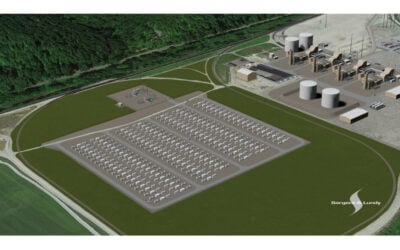Luis Ortiz: “The value chain and vendor ecosystem for storage projects is ripe for new entrants from other renewable power industries, both in project development and BOS component supply.” Image: Southern California Edison, Scott Dreger.
The former VP of Solar Grid Storage has predicted average Balance of Systems (BoS) costs for energy storage will drop from around US$670 to less than US$400 per kilowatt in the next five years.
Luis Ortiz, an independent consultant who was most recently vice president of the SunEdison-acquired large-scale storage start-up, was lead-author of a report on the topic for GTM Research.
Enjoy 12 months of exclusive analysis
- Regular insight and analysis of the industry’s biggest developments
- In-depth interviews with the industry’s leading figures
- Annual digital subscription to the PV Tech Power journal
- Discounts on Solar Media’s portfolio of events, in-person and virtual
“Grid-scale energy storage balance of systems 2015-2020: architectures, costs and players” has just been published by the research and analysis firm. While cost reductions in batteries in particular have been a constant focus of media both within the industry and more recently in the broader landscape in part due to the ‘Tesla effect’, less has been said so far about the other costs of energy storage technologies and projects.
Storage BoS costs may not fall quite as dramatically as the cost of solar has done and to some extent will see “diminishing returns” as a result of having “piggybacked” on solar’s already-established industry ecosystem and best practise learning curves. The difference could be of an order of magnitude in dollars per kilowatt when compared with the tumbling costs of PV.
However, Ortiz predicted, between 2015 and 2020 storage BoS costs will fall by over 40% to less than US$400 per kilowatt. The difference in cost between solar inverters and their more expensive bi-directional storage-ready counterparts will also “compress”, Ortiz said.
Hardware costs will therefore decline fastest, while soft costs such as permitting and customer acquisition will also come down in costs but may take a little longer for the industry to see gains.
Project-related engineering, procurement and construction (EPC) costs such as site preparation and shipping will however be much harder to make inroads into reducing, the GTM report said, with only a 6% decline expected in the next five years.
Ortiz and his colleagues did not restrict their research to battery-tied utility-scale technologies- the BoS costs of flywheels and other storage media were also examined.
The energy storage market is evolving quickly, Ortiz said.
“The value chain and vendor ecosystem for storage projects is ripe for new entrants from other renewable power industries, both in project development and BOS component supply.”
Meanwhile, SunEdison has been somewhat quiet on the topic of Ortiz’s previous employer Solar Grid Storage since the acquisition was announced in March last year – the new parent company politely declined a couple of requests for interview around SGS and potential business models for its services during 2015.






